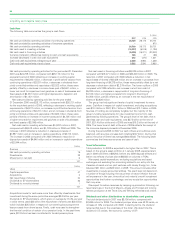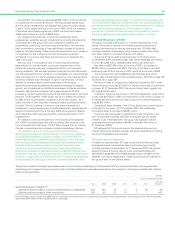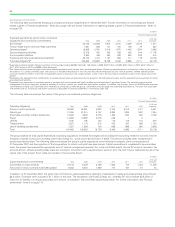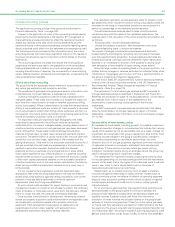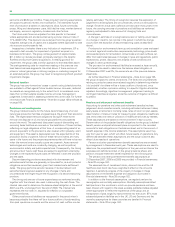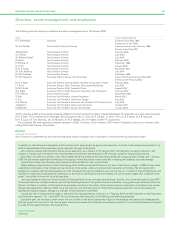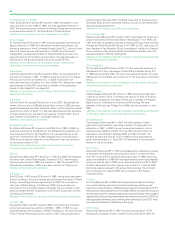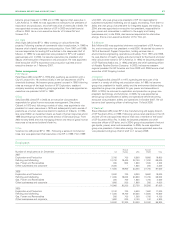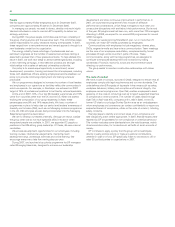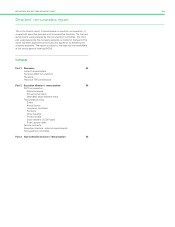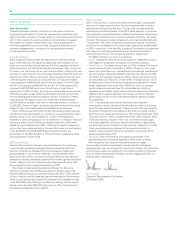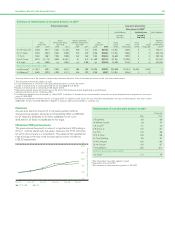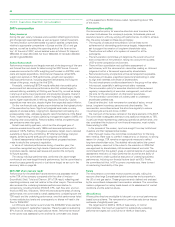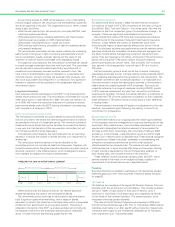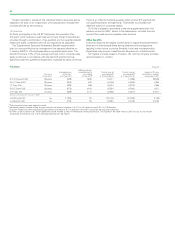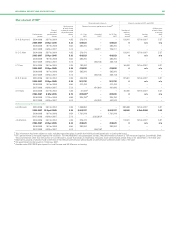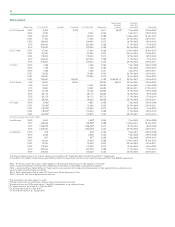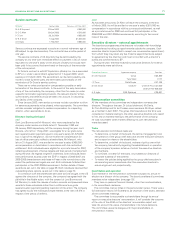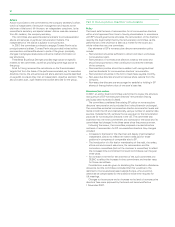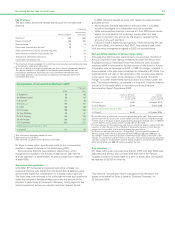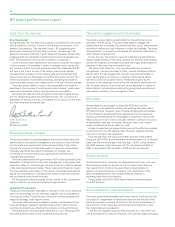BP 2007 Annual Report Download - page 66
Download and view the complete annual report
Please find page 66 of the 2007 BP annual report below. You can navigate through the pages in the report by either clicking on the pages listed below, or by using the keyword search tool below to find specific information within the annual report.
Part 1: Summary
Dear Shareholder
This year has been a period of transition for the group and so the
long-standing principles that guide the remuneration committee have
been particularly in evidence. These centre on a demanding performance
link, for the majority of executive directors’ remuneration, to support
the creation of long-term shareholder value; and the application of
informed judgement by the committee, using both quantitative and
qualitative assessments, to ensure a fair and appropriate reward
for the executive directors.
Executive changes
Key among the transitions was the appointment of Dr Hayward as
group chief executive. Mr Inglis was appointed chief executive of our
exploration and production business and Mr Conn assumed the role of
chief executive of our refining and marketing business. They, along with
Dr Grote in his continuing role as chief financial officer, make up the new
top team for the company. The committee considered both the scale and
importance of their roles as well as the operating style of the new team
in reviewing their remuneration during the year. Dr Hayward’s salary
was increased to £950,000 per annum and the salary of both Mr Inglis
and Mr Conn was set at £650,000 per annum. Dr Grote’s salary was
increased to $1,300,000 per annum. All will have a target bonus
opportunity of 120% of salary and long-term performance share awards
of 5.5 times salary. These performance shares only vest to the extent
that demanding performance conditions are met. In addition to these
ongoing plans, Mr Inglis and Mr Conn were each recently granted
one-off retention awards in the form of restricted shares to a value of
£1,500,000. These will vest in equal tranches after three and five years,
subject to their continued service and satisfactory performance.
Both Lord Browne and Mr Manzoni left the company during the year.
Lord Browne remained eligible for a lump sum ex gratia superannuation
payment equal to one year’s salary but, in light of his resignation,
received no other compensation on his retirement. Mr Manzoni received
one year’s salary in line with his contractual entitlement. Both were
eligible for a pro-rata bonus for 2007, reflecting the results achieved as
well as their time employed during the year. Both retain full participation
in the 2005-2007 and 2006-2008 share element but forfeit any
participation in the 2007-2009 plan. They both retain outstanding share
options granted in earlier years.
2007 performance
Overall performance for the year was constrained by the continuing
impact of past operating challenges. Bonuses awarded reflect the
balance of somewhat disappointing financial results coupled with
good progress on non-financial measures, including health, safety
and environment (HSE), and very committed efforts by the executive
directors to resolve past issues, advance the forward agenda and deliver
results. These are set out in the summary table opposite, along with
all remuneration paid to executive directors in 2007.
The impact of past operating problems affected the Executive
Directors’ Incentive Plan (EDIP) share element. Shares vest in this
element based principally on the total shareholder return (TSR) relative
to the oil majors over the three-year performance period. Performance
failed to meet satisfactory levels and consequently no shares will vest
in the 2005-2007 plan. Although Lord Browne similarly did not receive
shares under the main 2005-2007 plan, around 15% of the shares of
the separate leadership portion vested.
Review of policy
With a new top team in place and having come through a testing time
in terms of company performance, the committee decided to review
remuneration policy during the year. The key area of review was the
performance conditions applied to the EDIP share element. In particular,
the committee considered whether additional performance measures or
non-financial measures, such as health and safety indicators, should be
included. The review included consultation with major shareholders and
a comparison with other companies’ remuneration policies. The review
reinforced our confidence in the current plan, approved by shareholders
in 2005, in particular in the flexibility it gives us to exercise our judgement
with regard to underlying performance and non-financial indicators
without being formulaic. No changes to the policy are planned.
For 2008, therefore, our policy is as follows:
–Salary Salaries are reviewed annually, based on independent advice,
with regard to comparator companies and market conditions.
–Annual bonus ‘On-target’ bonus is set at 120% of salary. The normal
maximum bonus, also unchanged, is 150% of salary but, as in past
years, the committee may in exceptional circumstances award bonus
above that level if deemed justified by performance. Bonus for 2008
will reflect the business priorities of safety, people and performance
as articulated by Dr Hayward. Of the 120% ‘on-target’ bonus, 50 will
be measured on financial results, principally earnings before interest,
taxes, depreciation and amortization (EBITDA), return on average
capital employed and cash flow; 25 will be based on safety as
assessed by the safety, ethics and environment assurance committee
(SEEAC); 25 on people, behaviour and values; and 20 on individual
performance, which will primarily reflect relevant operating results
and leadership.
–EDIP The share element will provide the primary long-term
remuneration vehicle. Shares will be awarded to a level of 5.5 times
salary for each executive director. These will vest after three years to
the extent that performance relative to the other oil majors merits it.
Performance is measured principally on TSR versus ExxonMobil, Shell,
Total and Chevron. 100% of shares vest if first, 70% if second, 35%
if third and nothing if fourth or fifth. The committee will also apply
informed judgement, looking at overall performance in determining
the final vesting level. Shares that vest must be retained for a further
three years before being released to the executive director. In
addition, each executive director is expected to build a significant
personal shareholding in BP.
–Pensions Executive directors are eligible to participate in the
appropriate pension schemes applying to their home countries.
With this policy, the majority of executive directors’ target
remuneration is performance-based. Recognizing that unforeseen
developments mean no remuneration structure is perfect, the committee
will continue to apply its judgement in the implementation of the policy
so as to reflect shareholders’ interests and also engage and retain our
talented team of executives.
Dr D S Julius
Chairman, Remuneration Committee
22 February 2008
64


